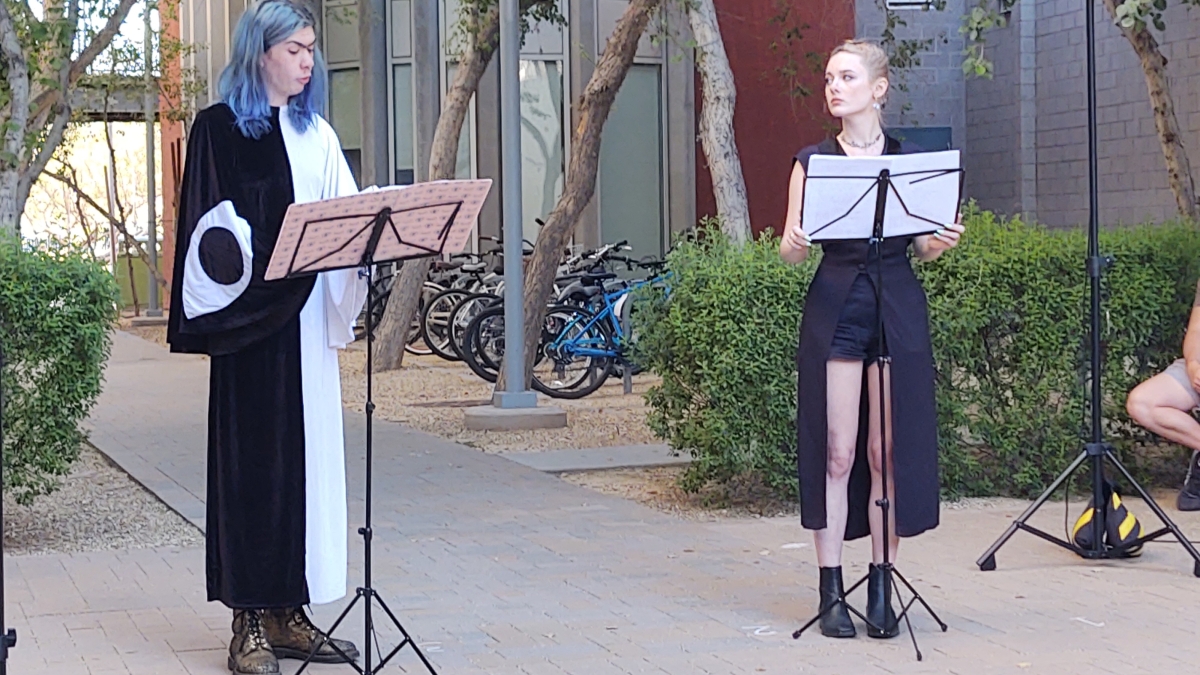ASU honors students use ancient Greek plays to address contemporary issues

Hugo Crick-Furman (left) played the title character Medea and Bronwyn Elizabeth (right) played Jason, in a staged reading of the ancient Greek play "Medea" at Barrett, The Honors College.
How can the study of ancient texts lead to better understanding of contemporary issues around social equity, diversity and inclusion?
The Theater of Difference project in Barrett, The Honors College at Arizona State University is helping students tackle these complex subjects through the reading of ancient Greek tragedies by Athenian playwright Euripides.
“Our goal is to see how ancient texts can help us illuminate, help us articulate and even help us work through contemporary issues, especially as they pertain to equity and inclusion,” said J.R. O’Neill, Barrett Honors faculty fellow, who is leading the project.
“We also aim to recognize and celebrate difference, learn to avoid conflict and understand our implicit biases,” O’Neill added.
The Theater of Difference, which is part of the honors college’s overall efforts to encourage dialogue about diversity and inclusion, started last spring with an honors course focusing on Euripides’ "Medea," featuring the main characters of Jason and Medea, and various themes including passion, rage, betrayal, revenge, discrimination and pride.
Students spent the semester reading, discussing and interpreting the play, and they capped off the course with a staged performance last April in the outdoor amphitheater at Barrett, The Honors College’s Tempe complex.
The Theater of Difference is continuing in spring 2022 with a course on Euripides’ "Bacchae," which includes themes of xenophobia, sexual difference and gender identity.
O’Neill said a staged reading of "Bacchae" is planned for next April.
“I think that the most vital thing we can take away from the performance of texts like this is looking into and critically examining what might be resounding in a modern context. If Medea holds a mirror up to modern society, what about that reflection is too close to reality for comfort?” said Bronwyn Elizabeth, who played Jason in the honors college's performance of "Medea."
“Reading as Jason, I felt incredible discomfort, particularly speaking lines about his perception of what civilization is, and how his preconceptions about other cultures are rooted in a fundamental sense of nationalism and xenophobia. The reason this struck such a chord in me is because we see these sentiments echoed by bigoted people in nearly every facet of American society,“ she said, pointing out how many people, including politicians, weaponize such words as “illegal,” “citizen” and “civilized.”
"Having to play a character so deeply rooted in his own privilege caused me to reexamine mine. What about my privileged position in society would enable bigotry, and how do I do the work to dismantle that?”
Andrea Yang, who performed as a member of the chorus, said themes of gender identity and discrimination stood out to her.
“We can view many of these themes reflected in our modern society. From anxieties about immigrants who are coming to 'steal our jobs' to how we stereotype women, these themes continue to be significant, which is what makes this play so enduring,” Yang said.
Hugo Crick-Furman, who played the title character Medea, said the play points up the complexity of societal issues.
“This is such a rich text, it's difficult to pinpoint any themes as being the most important. The most relevant though, I think, are the themes of foreignness and gendered relations and discrimination. I think that one thing that can be taken from the play is the value of coalition-building in the face of discrimination,” Crick-Furman said.
Laura Spielvogel served as dramaturg for the play. Her role was to become well-versed on the play — its characters, themes and meaning — in order to assist the actors in interpreting the play and developing their characters.
“Issues of gender equality, xenophobia and classicism are still around. They live in our social media newsfeed, sometimes much to our discomfort or even our grief. Increasingly — and thankfully — we are beginning to see that these things are our problem, not the problem of these identities by themselves. In that way, when we enter the theater, we are not only coming to see the story of Medea and Jason, but the story of ourselves, and hopefully we leave the theater ready to write a new and better page of the human experience,” she said.
More Arts, humanities and education

ASU student finds connection to his family's history in dance archives
First-year graduate student Garrett Keeto was visiting the Cross-Cultural Dance Resources Collections at Arizona State University…

ASU alumna makes her way back to the ASU Gammage stage for '¡azúcar!'
As the Los Angeles-based CONTRA-TIEMPO dance group prepares for its upcoming production “¡azúcar!” at ASU Gammage, for one member…

ASU FIDM professor wins international award for fantastical, sustainable creation
The horror of an ailing Earth inspired an Arizona State University fashion professor to create a fantastical garment out of…